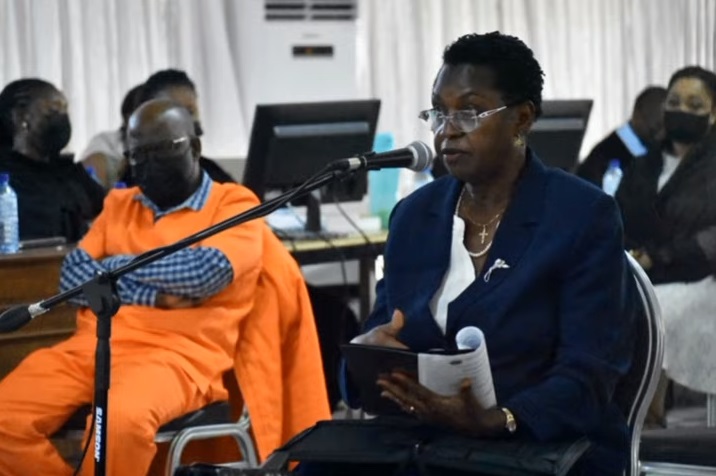Mozambique: Nampula residents announce peaceful demonstration against fuel crisis
Hidden debts trial: 19 November 2021 – AIM report

Screen grab: Youtube
- The State is above the law, claims Bank of Mozambique witness
Joana Matsombe, a former director of the Bank of Mozambique, on Friday admitted that she had broken the foreign exchange law regulations when, in 2014, she had authorised the 850 million dollar loan from Credit Suisse to the Mozambique Tuna Company (Ematum), but justified her behavior partly on the grounds that she trusted the other state officials involved, and partly because, if she hadn’t signed the authorization, she would have lost her job.
At the time Matsombe was the third most important officer in the bank, behind only the governor, Ernesto Gove, and the deputy governor, Antonio Pinto de Abreu. On the day the Ematum dossier landed on her desk, both Gove and Abreu were absent, and so she had to decide whether to authorise the loan.
Matsombe was giving evidence to the Maputo City court in the case where 19 people are facing charges in connection with Ematum and two other fraudulent companies, Proindicus and MAM (Mozambique Asset Management).
Mozambique’s foreign exchange law regulations state that any foreign loan to a Mozambican private company must be authorized by the Bank of Mozambique, and, although their shareholders are all state bodies, Proindicus, Ematum and MAM were set up legally as private companies.
Perhaps whoever had that bright idea did not read the law carefully. For Article 83 of the regulations of the foreign exchange law states explicitly that the Bank of Mozambique may not authorize foreign loans to any private company in cases where the loans will be repaid with resort to a state guarantee.
All two billion dollars of loans to Proindicus, Ematum and MAM depended on guarantees issued by the government of the then President Armando Guebuza. Had it obeyed, the law, the Bank of Mozambique would have rejected all of them.
But for Matsombe, the Mozambican state is above the law. “The state is sovereign, and it is above all of us, including the Bank of Mozambique”, she told the court. “The Ministry of Finance is above the central bank”.
She admitted that, “under normal circumstances, I should not have signed the authorization. But I was under pressure. I was told it was urgent”.
The Ematum loan dossier ws stamped with the words “confidential” and “urgent” and a fellow member of the Bank of Mozambique board, Waldemar de Sousa, insisted with her on the urgency of the bank’s authorization.
Matsombe claimed that she had never read the contract between Ematum and Credit Suisse, so she may not have known that it was Credit Suisse that was insisting on urgent authorisation. One of the prior conditions for Credit Suisse granting the loan was authorisation by the Bank of Mozambique.
She said she did not need to read the contract because other central bank officials, who answered to her, had read all the documents, and gave opinions in favour of authorising the loan.
Matsombe said the request was so irregular that it should never have entered the bank at all. But the financial and supply contracts had already been signed, and Finance Minister Manuel Chang had already signed the state guarantee for the loan, “so it was practically a fait accompli”, she said.
“I was doing my duty to the State”, she added, but to cover herself, when she signed the authorization, she added that the Governor should ratify it on his return,
Prosecutor Sheila Marrengula asked what was the legal basis for signing the authorization, since the foreign exchange law clearly ruled out such authorisation. She asked the same question repeatedly, and an increasingly flustered Matsombe failed to answer. “How could I oppose it? I had no way to reject it”, she said.
The demand for authorization came from “higher authorities”, she claimed.
“What higher authorities?”, asked Marrengula.
“I have no idea”, replied Matsombe. “I only know that the document that landed on my desk was marked ‘confidential’ and ‘urgent’. It was a state secret, and I couldn’t have done anything else, unless I wanted to lose my job”.
Marrengula noted that Matsombe had simply endorsed the opinions of her colleagues, who had given Ematum the green light.
“I trusted their opinions”, Matsombe said. “When my colleagues said it’s a State project, what else could I do?”
“So you’re saying it wasn’t a question of the law at all, but you just had no alternative?”, asked Judge Efigenio Baptista,
“Yes”, she replied, before slandering every honest worker in the Mozambican state, by adding that any other state employee “would have done the same”.
There was a chain of command in the central bank. The Ematum file passed through at least three hands before it reached Matsombe, and all of them gave a positive opinion. Had any one of the bank officials shown the slightest integrity and demanded to follow the law rather than illicit instructions from faceless “higher authorities”, then the whole corrupt scheme would have collapsed, and there would be no hidden debts.













Leave a Reply
Be the First to Comment!
You must be logged in to post a comment.
You must be logged in to post a comment.